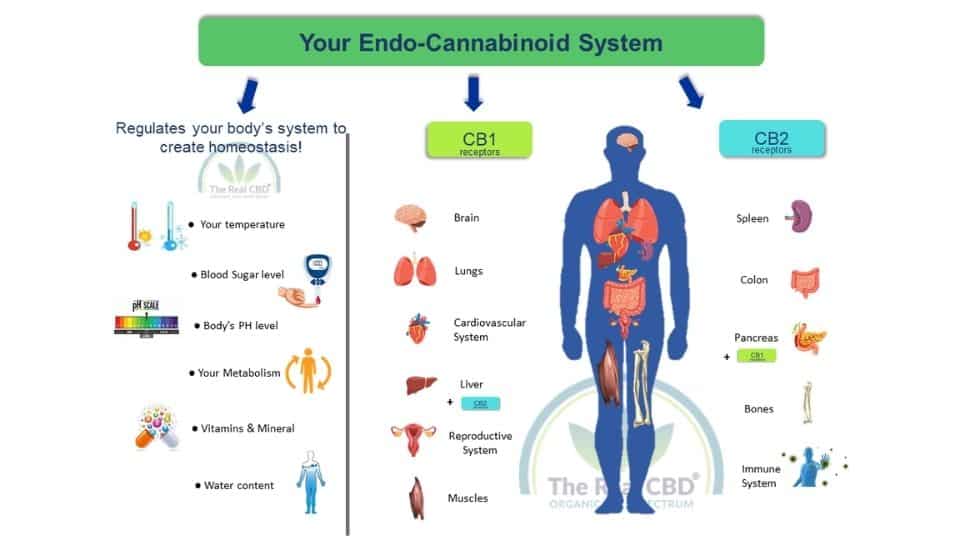CBD Interacts with the Body’s Endocannabinoid System
As research shows, CBD interacts with the body’s endocannabinoid system. The oil has recently gained popularity as a potential natural solution for anxiety and stress. Cannabidiol (CBD) is one of the many cannabinoids found in the cannabis plant, known for its therapeutic properties.
While CBD is derived from cannabis, it is essential to note that it does not produce the psychoactive effects commonly associated with marijuana use. Tetrahydrocannabinol (THC) is the compound responsible for the “high” sensation, and CBD products contain only trace amounts of THC (less than 0.3% in the United States) or maybe entirely THC-free.
Research on CBD’s effectiveness in treating anxiety and stress is ongoing, and while some studies suggest potential benefits, more research is needed to understand its effects fully.
CBD may help with anxiety and stress
However, here are some ways in which CBD may help with anxiety and stress:
Interaction with the endocannabinoid system: CBD interacts with the body’s endocannabinoid system, which plays a role in regulating various physiological processes, including mood, stress response, and sleep. By interacting with the endocannabinoid receptors, CBD promotes a sense of calm and relaxation.
Potential anti-anxiety effects:
Some research suggests that CBD may have anti-anxiety properties. It is believed to influence the serotonin receptors in the brain, which regulate mood and anxiety. By modulating serotonin levels, CBD may help reduce anxiety symptoms.
Sleep improvement:
Some users have reported CBD to promote better sleep quality. By reducing anxiety and promoting relaxation, CBD may indirectly aid in improving sleep patterns, which can benefit individuals experiencing stress and anxiety.
Anti-inflammatory effects:
Chronic stress and anxiety can lead to inflammation in the body, harming overall health. CBD has been shown to have anti-inflammatory properties, which may help mitigate the physiological effects of stress and anxiety.
It is important to note that while CBD shows promise as a natural solution for anxiety and stress, it is not a cure-all and may not work the same way for everyone. The optimal dosage and method of administration can vary from person to person, and it is advisable to consult with a healthcare professional before starting any new supplement or treatment.
Additionally, choosing high-quality CBD products from reputable manufacturers is essential, as the market is still largely unregulated. Look for products that have undergone third-party testing to ensure their quality and purity.
Using Hemp for CBD Oil
Hemp is a variety of cannabis bred explicitly for industrial purposes, including CBD oil production. Hemp-derived CBD oil is legally available in many countries, including the United States, as long as it contains less than 0.3% THC.
Hemp-derived CBD oil has become popular due to its potential therapeutic benefits and non-intoxicating nature. Here are some key points about using hemp for CBD oil:

CBD extraction:
CBD oil is typically extracted from the flowers, leaves, and stalks of the hemp plant. Different extraction methods can be used, such as CO2 extraction, ethanol extraction, or solvent extraction, and CO2 extraction is the most efficient and safe method.
CBD content:
Hemp plants naturally contain higher levels of CBD and lower levels of THC compared to marijuana plants, and this is why hemp is the primary source of CBD extraction. CBD oil derived from hemp should have minimal THC content (less than 0.3% in the United States), which ensures it does not produce psychoactive effects.
Legal considerations:
Hemp-derived CBD oil is legal in many countries and states where marijuana is still illegal. However, it’s important to note that regulations can vary, so you must check the specific laws in your jurisdiction.
Quality and safety:
Choosing high-quality CBD products derived from hemp is crucial. Look for products that have undergone third-party testing to ensure they are free from contaminants and accurately labeled in terms of CBD and THC content.
Potential benefits:
Hemp-derived CBD oil may offer similar potential benefits as CBD oil derived from marijuana. These benefits include possible relief from anxiety, stress, pain, inflammation, and sleep issues. However, it’s important to note that the research on CBD is still ongoing, and more evidence is needed to understand its effects fully.
Dosage and administration:
The optimal CBD oil dosage can vary depending on factors such as body weight, metabolism, and the specific condition being addressed. It is recommended to start with a low dose and gradually increase it while monitoring the effects. CBD oil can be taken orally, sublingually (under the tongue), or applied topically.
As with any supplement or natural remedy, it’s advisable to consult a healthcare professional before using hemp-derived CBD oil, especially if you have any underlying medical conditions or are taking medications that may interact with CBD.
Overall, using hemp for CBD oil provides a legal and accessible option for those seeking potential therapeutic benefits associated with CBD. However, it’s essential to ensure you purchase high-quality products and approach CBD use as part of a holistic approach to health and wellness.
The Mechanisms by which CBD Interacts with the Body’s Endocannabinoid System
CBD interacts with the body’s endocannabinoid system (ECS), a complex signaling system that regulates various physiological processes, including pain perception, mood, appetite, sleep, and immune response. The ECS consists of endocannabinoids (cannabinoids naturally produced by the body), cannabinoid receptors (CB1 and CB2 receptors), and enzymes responsible for the synthesis and breakdown of endocannabinoids.
The exact mechanisms by which CBD interacts with the ECS are not fully understood, but it is believed to have several effects:
Modulation of cannabinoid receptors:
CBD has a low affinity for cannabinoid receptors but can modulate their activity. It may indirectly affect the CB1 and CB2 receptors, leading to various effects throughout the body. CBD’s interaction with these receptors contributes to its potential analgesic (pain-relieving) properties.
Inhibition of enzyme activity:
CBD may inhibit the enzymes that break down endocannabinoids, such as fatty acid amide hydrolase (FAAH). By inhibiting FAAH, CBD can increase endocannabinoids like anandamide, which is known to have analgesic effects.
Activation of non-cannabinoid receptors:
CBD can also interact with other receptors in the body, such as serotonin receptors (5-HT1A), vanilloid receptors (TRPV1), and opioid receptors. Activation of these receptors can influence pain perception and contribute to CBD’s potential pain-relieving effects.
How Hemp CBD Oil Alleviates Pain Symptoms.
Regarding pain alleviation, CBD may act through various mechanisms:
Anti-inflammatory effects: Inflammation often plays a role in pain conditions. CBD has been shown to have anti-inflammatory properties, which can help reduce inflammation and subsequent pain.
Modulation of pain signaling:
CBD may influence the transmission of pain signals in the central nervous system. It can interact with receptors involved in pain processing and modify pain perception.
Indirect effects on mood and anxiety:
Chronic pain can lead to mood disturbances and increased anxiety. CBD’s potential anxiolytic and mood-stabilizing effects may indirectly contribute to pain relief by improving mood and reducing stress.
While anecdotal evidence and user testimonials suggest that CBD may provide pain relief for some individuals, it is essential to note that these experiences are subjective and not considered scientific evidence. Personal accounts can vary widely, and individual responses to CBD may differ due to dosage, product quality, and the specific nature of the pain condition.
To better understand CBD’s effects on pain, scientific research, including controlled clinical trials, is crucial. Some studies have shown promising results regarding CBD’s potential as an analgesic, particularly in certain types of pain, such as neuropathic pain and pain associated with inflammatory conditions like arthritis.
Conclusion
In conclusion, while CBD oil may offer potential benefits for anxiety and stress, it is crucial to approach it as part of a holistic approach to managing these conditions. Incorporating stress-management techniques, maintaining a healthy lifestyle, and seeking professional guidance can contribute to overall well-being.
It is recommended to consult with a healthcare professional who can provide guidance based on your specific circumstances and help you make informed decisions.



